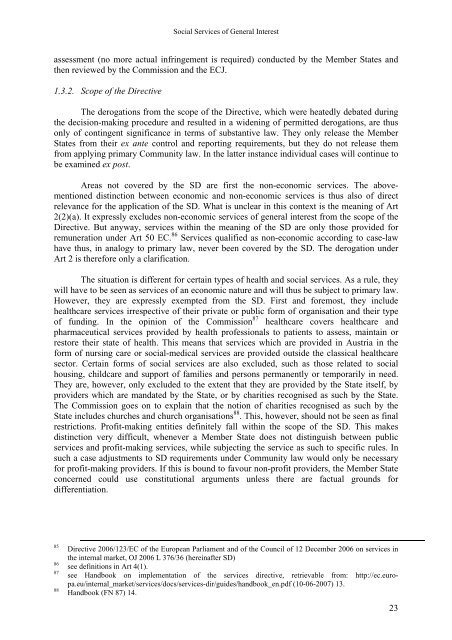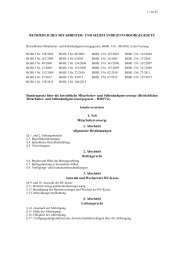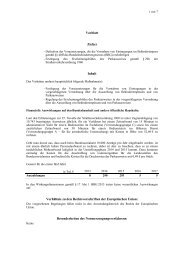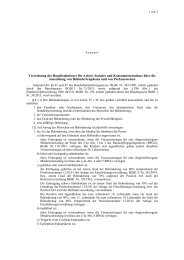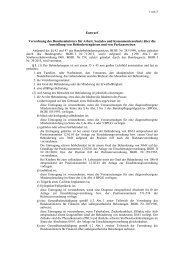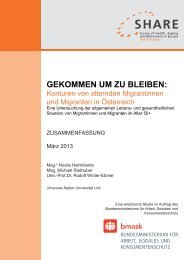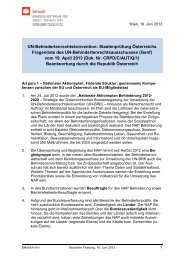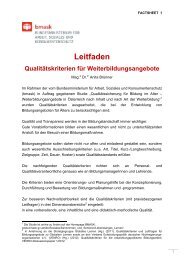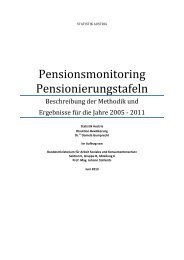Social Services of General Interest (SSGI)
Social Services of General Interest (SSGI)
Social Services of General Interest (SSGI)
You also want an ePaper? Increase the reach of your titles
YUMPU automatically turns print PDFs into web optimized ePapers that Google loves.
<strong>Social</strong> <strong>Services</strong> <strong>of</strong> <strong>General</strong> <strong>Interest</strong><br />
assessment (no more actual infringement is required) conducted by the Member States and<br />
then reviewed by the Commission and the ECJ.<br />
1.3.2. Scope <strong>of</strong> the Directive<br />
The derogations from the scope <strong>of</strong> the Directive, which were heatedly debated during<br />
the decision-making procedure and resulted in a widening <strong>of</strong> permitted derogations, are thus<br />
only <strong>of</strong> contingent significance in terms <strong>of</strong> substantive law. They only release the Member<br />
States from their ex ante control and reporting requirements, but they do not release them<br />
from applying primary Community law. In the latter instance individual cases will continue to<br />
be examined ex post.<br />
Areas not covered by the SD are first the non-economic services. The abovementioned<br />
distinction between economic and non-economic services is thus also <strong>of</strong> direct<br />
relevance for the application <strong>of</strong> the SD. What is unclear in this context is the meaning <strong>of</strong> Art<br />
2(2)(a). It expressly excludes non-economic services <strong>of</strong> general interest from the scope <strong>of</strong> the<br />
Directive. But anyway, services within the meaning <strong>of</strong> the SD are only those provided for<br />
remuneration under Art 50 EC. 86 <strong>Services</strong> qualified as non-economic according to case-law<br />
have thus, in analogy to primary law, never been covered by the SD. The derogation under<br />
Art 2 is therefore only a clarification.<br />
The situation is different for certain types <strong>of</strong> health and social services. As a rule, they<br />
will have to be seen as services <strong>of</strong> an economic nature and will thus be subject to primary law.<br />
However, they are expressly exempted from the SD. First and foremost, they include<br />
healthcare services irrespective <strong>of</strong> their private or public form <strong>of</strong> organisation and their type<br />
<strong>of</strong> funding. In the opinion <strong>of</strong> the Commission 87 healthcare covers healthcare and<br />
pharmaceutical services provided by health pr<strong>of</strong>essionals to patients to assess, maintain or<br />
restore their state <strong>of</strong> health. This means that services which are provided in Austria in the<br />
form <strong>of</strong> nursing care or social-medical services are provided outside the classical healthcare<br />
sector. Certain forms <strong>of</strong> social services are also excluded, such as those related to social<br />
housing, childcare and support <strong>of</strong> families and persons permanently or temporarily in need.<br />
They are, however, only excluded to the extent that they are provided by the State itself, by<br />
providers which are mandated by the State, or by charities recognised as such by the State.<br />
The Commission goes on to explain that the notion <strong>of</strong> charities recognised as such by the<br />
State includes churches and church organisations 88 . This, however, should not be seen as final<br />
restrictions. Pr<strong>of</strong>it-making entities definitely fall within the scope <strong>of</strong> the SD. This makes<br />
distinction very difficult, whenever a Member State does not distinguish between public<br />
services and pr<strong>of</strong>it-making services, while subjecting the service as such to specific rules. In<br />
such a case adjustments to SD requirements under Community law would only be necessary<br />
for pr<strong>of</strong>it-making providers. If this is bound to favour non-pr<strong>of</strong>it providers, the Member State<br />
concerned could use constitutional arguments unless there are factual grounds for<br />
differentiation.<br />
85 Directive 2006/123/EC <strong>of</strong> the European Parliament and <strong>of</strong> the Council <strong>of</strong> 12 December 2006 on services in<br />
the internal market, OJ 2006 L 376/36 (hereinafter SD)<br />
86 see definitions in Art 4(1).<br />
87 see Handbook on implementation <strong>of</strong> the services directive, retrievable from: http://ec.europa.eu/internal_market/services/docs/services-dir/guides/handbook_en.pdf<br />
(10-06-2007) 13.<br />
88 Handbook (FN 87) 14.<br />
23


